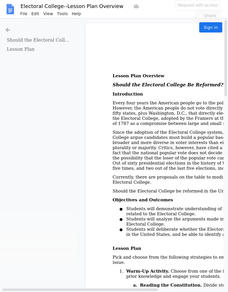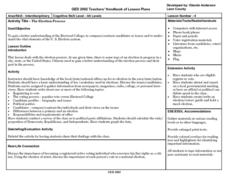Classroom Law Project
What does the Constitution say about voting? Constitutional Amendments and the Electoral College
As part of a study of voting rights in the US, class members examine Constitutional amendments connected with voting and the role of the Electoral College in the election process.
Carolina K-12
Exploring the Electoral College
Does your vote really count? This activity helps young voters learn about the electoral college through a TED talk, a helpful handout, discussion prompts, and then a role-playing activity that has participants simulating an election on a...
C-SPAN
The Electoral College and the Constitution
What is the purpose of the Electoral College? Is it antiquated, or does it have a place in today's political climate? High schoolers view a series of video clips as they analyze the parts of the United States Constitution that address...
C-SPAN
Electoral College Pros/Cons and Alternatives
If every vote counts, why do we need the electoral college? Middle and high schoolers study the Constitutional precedent of the electoral college, as well as its place in historical and modern elections, with an engaging social studies...
C-SPAN
Electoral College
Most people are surprised to learn that American democracy is not as direct as they thought. Using a package of guiding questions, charts and curated videos, learners unpack the unique American institution of the Electoral College. The...
K20 LEARN
Electoral College: Does My Vote Count?
How can a candidate get the most votes, yet still lose the race for the presidency? This is has happened more than once in American history, including in the elections of 2000 and 2016. Using an activity for creating group notes, young...
Constitutional Rights Foundation
270 Votes to Win: The Electoral College in the United States
What exactly is the Electoral College and how does it work? The lesson plan is part of a larger series on government that explains what the Electoral College is and how it helps determine an election winner. Academics participate in...
Curated OER
Tally of the 1824 Electoral College Vote
Twelfth graders study the parts of the Constitution that address presidential election. They complete a variety of activities designed to spark debate about the flaws in the Electoral College system.
iCivics
Drafting Board: Electoral College
Should the president of the United States be voted by the Electoral College or the popular vote? Your young historians will consider the pros and cons of the Electoral College, and make an argument using reasons and evidence provided in...
Curated OER
Does My Vote Count? Teaching the Electoral College
Students comprehend the purpose, function, origin, and historical development of the electoral college. They evaluate issues of fairness and representation in the electoral process, both individually and through group discussion....
City University of New York
Presidential Elections and the Electoral College
To understand the controversy surrounding the US 2000 presidential election, class members investigate the rationale behind the Electoral Collage, the intimidation involved in the election of 1876, and the 2004 American League...
Curated OER
How the Electoral College Works
Students research the history and mechanics of the Electoral College and formulate opinions as to whether this institution should be preserved, modified or eliminated. They predict future outcomes of electoral vs. popular votes.
National Constitution Center
Town Hall Wall: College Exam
The college that directly affects young citizens' lives is not the university they're applying to. Learn about the Electoral College in a town hall activity in which class members debate the merits of the current system versus electing a...
DocsTeach
Election of 1800
The 2020 election is not the only unpredictable one in history. The Election of 1800 highlighted an unforeseen event in a presidential election. The activity reviews documents from the elections and what happened when the electoral...
Constitutional Rights Foundation
The Troubled Elections of 1796 and 1800
Congress does more than create new laws. Political scientists delve into the elections of 1796 and 1800 to understand how political parties, the Electoral College, and personal agendas affected the election process. The resource also...
Heritage Foundation
The House of Representatives
The House of Representatives has a lot of responsibility in the United States government. But how did it all begin, and why is it the way it is now? A comprehensive lesson answers all of these questions about the US Constitution and...
Heritage Foundation
The Office of the Executive
An executive is not just a leader of a company; you can also use the term to describe the president of the United States. The ninth part of a 20-part unit teaches high schoolers about the importance of the executive branch and the...
Curated OER
The Election Process
Students examine how Electoral College works, compare and contrast candidates or issues, and discuss importance of becoming registered, active voting individuals.
Heritage Foundation
The Senate
Do your learners struggle to understand the differences between the Senate and the House of Representatives? Help them develop an understanding of how the US Constitution's clauses affect the Senate's operations. A high-quality social...
Constitutional Rights Foundation
Winner-Take-All: The Two-Party System
Two's company, three's a crowd. High school historians learn about the Electoral College, a two-party, winner-take-all voting system in the United States. The lesson explains the pros and cons of the two-party system, roadblocks for...
Curated OER
Take a Stand!
Here is a four-corner debate-style activity specifically geared to election year issues. Learners group themselves according to whether they strongly agree, agree, disagree, or strongly disagree with statements that relate to elections...
Heritage Foundation
Voting and the Constitution
How difficult was it for everyone to get voting rights? Understanding voting rights and the fight to get them for everyone in the United States can be tricky for some learners. However, they are clarified after engaging in the...
Curated OER
Election 2000
Students review the 2000 presidential election. Students write an expository essay in response to the following: Should the election process in the United states be changed?
Curated OER
Proportional Representation: A Fairer Voting System?
Tenth graders work as a grade to conduct a mock election. They tally votes in two different systems and discuss if proportional representation or straight counting of votes leads to a fairer outcome.

























